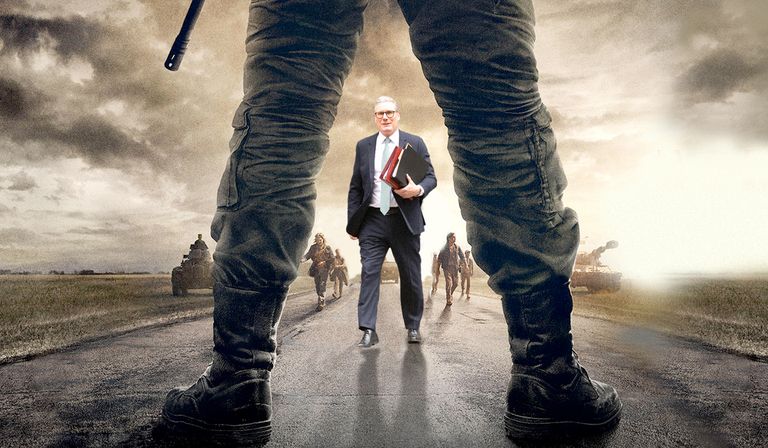When I was a teenager, the Stephen King book that scared me the most was by his alter ego, Richard Bachman. The Long Walk follows a group of young men in a competitive walk across America. If they advance at a rate slower than four miles an hour they are shot. That story has come to my mind again recently, not only because a Hollywood adaptation came out in September, but because the journey to the 2029 UK election feels rather like this slow death march.
Our tortuous trek began just over a year ago and there are more than three years left. The unease is especially profound for Labour, which has lost half of its support from the 2024 election. The Lib Dems, Greens, Tories and Labour are all now regularly polling at between 15 and 20 per cent.
Leading the charge is the contest’s primary antagonist, Nigel Farage’s Reform UK, with just under 30 per cent. Despite the press’s salivation over the prospect of Farage becoming PM, we are a long, long, well, walk from the next general election. Still, the wait is agonising, so in the meantime it’s worth thinking about what to expect along the way.
Let’s start with what we know. First up will be the local and devolved nation elections next spring, which will include all London boroughs, most metropolitan boroughs in England, the Senedd elections in Wales and the Holyrood elections in Scotland.
Right now, it looks like these will be carnage for Labour. The party has held a majority in the Senedd since its creation in 1999, but is running in third, behind Plaid Cymru and Reform. Those rivals were the frontrunners in the Caerphilly Senedd byelection, which Labour lost. In the Scottish parliament, Labour is already third in terms of seats, and that is unlikely to improve. And most local elections in England will be in London and metro areas, where Labour’s only way is down.
All except Britain’s big two parties will be winners in these elections. The SNP is likely to recover in Scotland, while Plaid Cymru is set to be the Senedd’s biggest party for the first time. In London and the English cities, the Greens and perhaps the Lib Dems will surge. And we should expect Reform to do well across the board. This will be existential for both Keir Starmer and Kemi Badenoch, who may well be forced out on the way to 2029.
But let’s say one or both survive. What happens next? There will be local elections annually until 2029, but only the London mayoral race in May 2028 stands out as a big moment. And rather more significant events may have taken place abroad by that time. Already Zohran Mamdani’s election as New York’s mayor has shifted the conversation about the merits of left populism.
First, the US Congressional midterms in November 2026 raise two questions. Will Trump refrain from interfering with the running of the vote? And, assuming elections are fair, can the Democrats strike back? Labour might feel comforted in a world where the answer to these questions is yes. If both answers are no, the dystopian military dictatorship of The Long Walk seems less fantastical.
Then, there is a French presidential election in April 2027, which will quite likely result in victory for the far-right National Rally and an ensuing collapse in confidence in the European Union. It would be just Starmer’s luck to have fully pivoted to a pro-EU policy by then.
And finally: a US presidential election in 2028. Presuming the survival of the US Constitution, this will be one without Trump on the ballot. No Trump means Starmer, or a future PM, no longer needs to pull their punches on populism. Unless, of course, the victor is someone King memorably called a “bully”: JD Vance.
That’s what we know lies ahead. What about the maybes? Net migration to the UK might collapse. Already, there are signs it could dip below 200,000, even 100,000, thereby finally achieving David Cameron’s 2010 goal for it to fall to the “tens of thousands”. That might take the heat out of the current migration debate, though likely at the cost of slow growth.
And that’s not the only risk to the economy. Everyone is warning that the enormous AI investment of the past few years is a bubble waiting to pop. Harvard economist Jason Furman reckons it accounted for 92 per cent of US growth this year. Whatever “wins” Labour ekes out on migration might be swallowed whole by a devastating AI crash.
Still, at least Labour knows it will be in charge until then, with roughly the same seats in parliament as now. The party just has to hang on, to keep on walking determinedly at four miles an hour. Meanwhile, its current chief rival, Reform, every week announces a new policy that’s a hostage to fortune—from ending the rights of immigrants to permanent residence to huge tax cuts.
Reform has to keep this up for the rest of the long walk. Justifying extreme policies drawn up on a cigarette packet, responding to racist remarks by MPs and councillors, preventing Kent County Council from collapsing. No wonder Farage seems to want an early election, not least after his disappointment coming second in Caerphilly. Having sprinted off to a lead, he has neglected the key lesson of the Long Walk: go slow, go steady—and don’t run out of steam too soon. Otherwise, the consequences could be fatal.













